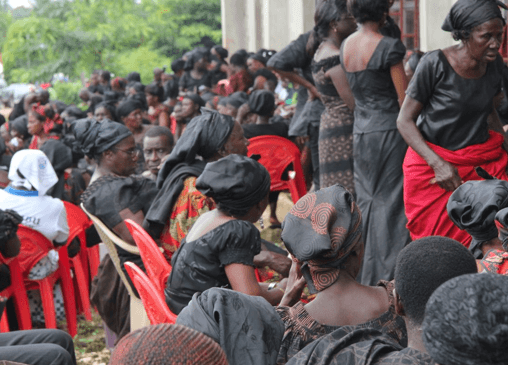In my area, our neighbour’s husband died. African traditions require that one should assist one’s neighbour in times of happiness, as well as in times of misfortune, so I went to express my sympathy and say “Yako”.[1]
The atmosphere was heavy in Madame Kouassi’s courtyard. Turning forty, this poor lady had just lost her husband. In such a situation, the courtyard was crowded with people. The cries and tears, which sometimes broke the heavy silence, gave a glimpse of the pain that prevails in these moments of loss of a loved one.
I found Madame Kouassi sitting in a corner of the courtyard, on a mat on the floor. Her head covered with a veil. She was surrounded by old women from the community. Although affected by the death of her husband, she will need much strength and courage to respect tradition: widowhood, a rite that widows perform at the death of their husband. The parents of her late husband came from the village to assist her and especially to make her follow the rites of widowhood.
Two different yardsticks
In African societies, at the death of the husband, the in-laws are responsible for ensuring that the surviving wife does follow the rites of widowhood. Widowhood can range from three months to one year. The characteristic of these rites, many and varied, is that they are generally degrading and burdensome for women. The widow has to wear appropriate dress.
Some ethnic groups require the shaving of the widow’s head, that she spend her days sitting directly on the floor under the sun, with it bathing her. The widow must constantly exhibit a sad attitude. Others go so far as to demand that the woman drink the bath water from her husband’s corpse to prove that she has nothing to do with his death.
In Africa, when the woman dies, the widower only has to bury the deceased. In general, men do not have to take part in any rite. They are even encouraged to remarry as soon as possible. While widows, whatever the content of the widowhood rite, must follow it to the letter, supposedly to honour the memory of the deceased. They are often forced to marry one of the deceased’s brothers. Should they refuse, they must remain alone as long as possible.
Voices are rising, but are not yet heard.
Since 2011, June 23 has been declared International Widows’ Day to draw attention to the many challenges women face when losing their husbands. Many people are unaware of this Day, so the celebration goes unnoticed.
“From a purely symbolic practice in the past, the rites of widowhood have become an instrument of physical, psychological, moral and economic violence and torture,” reveals Bernard Tondé (priest of the Diocese of Bondoukou in Ivory Coast), in his book “Le veuvage en Afrique”.
Like him, I plead for a humanisation of the rites of widowhood. The mistreatment of widows is a reality that requires special attention from legislation and the political sphere.
No woman should be deprived of her rights after the death of her husband.
[1] Baoulé ethnic term in central Côte d’Ivoire meaning: I sympathize with your pain.



